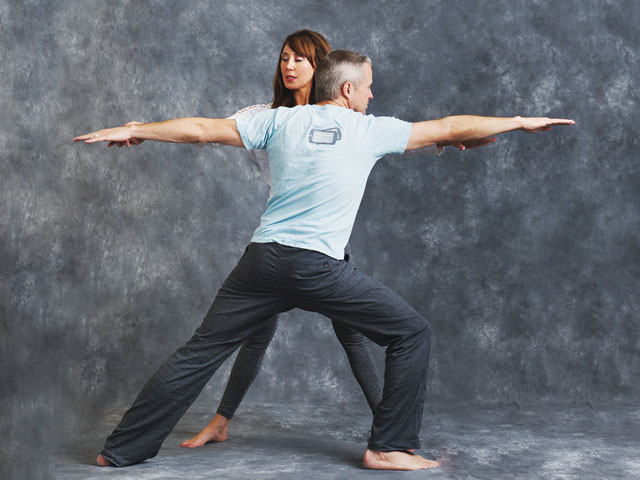
By Raquel Jex Forsgren, Yoga Therapist, C-IAYT –
“Embracing reverence and love for all (Ahimsa), we experience oneness.”
In The Secret Power of Yoga: A Woman’s Guide to the Heart and Spirit of the Yoga Sutras, author, spiritual leader and one of my beloved teachers, Nischala Joy Devi, said, “When we refuse to take the time to treat our bodies, emotions and minds, with reverence and love, they will often remind us—not so kindly—by failing to respond when we need them. Our ability to think clearly recedes. We may experience sadness or depression. After a time, our lack of ease may allow disease to creep into our life. Then we are obliged to take time for ourselves. It is much more pleasant and fun to do it willingly before any dis-ease invites itself into your life.”
According to the Anxiety and Depression Association of America, over 18% Americans are struggling with different types of anxiety disorders each year. It is the number one reason for disability. Over 40 million people are living with anxiety and only 36.9% of those people receive treatment. Nearly half of those diagnosed with either anxiety or depression suffer from both. Yoga creates calmness and ease. Here are some of the ways that a yoga practice fights depression and anxiety.
Yoga Calms Our Nerves
Yoga boosts levels of gamma-aminobutyric acid (GABA), a chemical in the brain that calms nerves. GABA is one of the main neurotransmitters in the brain. It inhibits brain activity, helping it relax. When GABA is low, our brains “stay on,” resulting in anxiousness and overstimulation.
Anxiety is interesting. In the original Yogic Texts, the yogis talk about the monkey mind. I’m from the West, so I talk about it as “running off the ranch.” What causes anxiety? It’s most often due to thinking about the past and ruminating over what you said, didn’t say, someone who hurt you, or someone you hurt, and the list goes on. It’s also caused by thinking about the future, where the what-if’s come to play. When you are being in the present, anxiety cannot come.
Yoga’s effectiveness at calming the nerves is directly related to modulation of the general stress response. Breathing evolves from being fast and clunky to rhythmic, slow and smooth. This slows the heart rate, lowers blood pressure, and, thereby, reduces the amount of the damaging stress hormone cortisol that is pumped from adrenal glands in response to the original stress. See how the cycle works?
One of the most effective ways to calm the nerves is to focus on your breath
Try sitting in just a simple cross-legged position on the floor, on your bed or in a chair with your hands just in front of your heart or on your lap. Notice how you are inhaling and how you are exhaling. Take five to ten breaths. Notice how your body, mind and breath feel. You may even try it holding a furry friend!
Conquering Depression and Rising Out of the Darkness
 Yoga can help conquer depression. The combination of movement and meditation in most classes makes yoga ideally suited to conquer depression. Both of these practices have been proven to improve mood and lessen the hold that depression can have. In fact, remember GABA? Practicing yoga causes an increase in GABA. Gaba helps ease the symptoms of depression. Many supplements and common pharmaceuticals contain GABA and are used to treat depression. Yoga increases this chemical in our brain naturally.
Yoga can help conquer depression. The combination of movement and meditation in most classes makes yoga ideally suited to conquer depression. Both of these practices have been proven to improve mood and lessen the hold that depression can have. In fact, remember GABA? Practicing yoga causes an increase in GABA. Gaba helps ease the symptoms of depression. Many supplements and common pharmaceuticals contain GABA and are used to treat depression. Yoga increases this chemical in our brain naturally.
As a yoga therapist, one of the most important tools that I use is to teach how to embrace what comes up during practice. Postures often open the heart and hip area, both of which are places where we hold deep-seated emotions and scars. Try practicing strong poses, such Warrior 2, to feel empowered. I tell my patients to feel what comes up in their body, notice where it is and embrace it. Lean into it. Listen to it and what it may be trying to tell them. I help them practice non-judgment on what is coming up, notice how their bodies feel and create the safest place possible for them to express them on the mat.
Start Now
Find a local studio. There are yoga studios everywhere that can teach you the basic postures. You’ll feel a physical benefit in your muscles and be calmer when you leave your first session. If you want to dig deeper to manage your anxiety, depression or other mood disorder, finding a yoga therapist may be the right move. Yoga therapists have a sub-specialty, such as in mood disorders, the aging body, cancer, cardiac rehabilitation, addiction and recovery and more. Look for a certified yoga therapist (C-IAYT) to ensure you are receiving the highest credentialed therapist.
If you have been diagnosed with clinical depression or suicidal, we are here to help. You can go to the website https://suicideprevention lifeline.org/talk-to-someone-now or call someone at 1-800-273-8255.
“We’re all just walking each other home.”
Raquel Jex Forsgren is a Certified Yoga Therapist, C-IAYT, a graduate from Soul Institute, certified by the International Association of Yoga Therapists, holds a Bachelor of Science in Biology and 25 years in pharmaceuticals. Raquel has been living Yoga for over a decade. Raquel Jex Forsgren lives in Chicago. You can reach her at livingyogatherapy@gmail.com, or visit her website at www.livingyoga-therapy.com.
Sources: The Secret Power of Yoga, Nischala Joy Devi; Anxiety and Depression Association of America; Yogabasics.com; Harvard Medical School Review; American Pyschological Association; Science Daily, August, 2017; Complementary Therapies in Clinical Practice
 Conscious Community Magazine Dedicated to Elevating Consciousness
Conscious Community Magazine Dedicated to Elevating Consciousness




